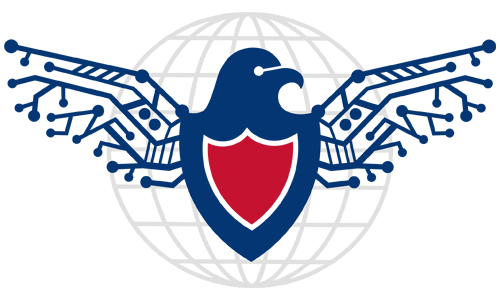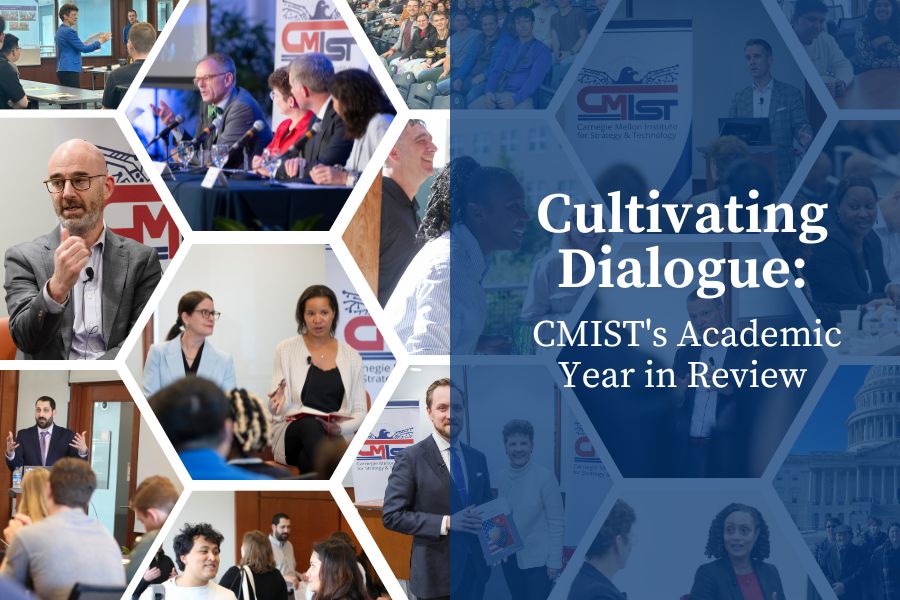
Cultivating Dialogue: CMIST's Academic Year in Review
By Jess Regan
As the 2024-2025 academic year at the Carnegie Mellon Institute for Strategy and Technology (CMIST) comes to a close, we reflect on the broad spectrum of engagements offered this year. Our events have fostered critical discussions, connected students and faculty with national and international leaders, and explored topics of strategy, technology, and policy. From welcoming new students to hosting high-level dialogues on pressing global challenges, CMIST has served as a nexus for intellectual discourse.
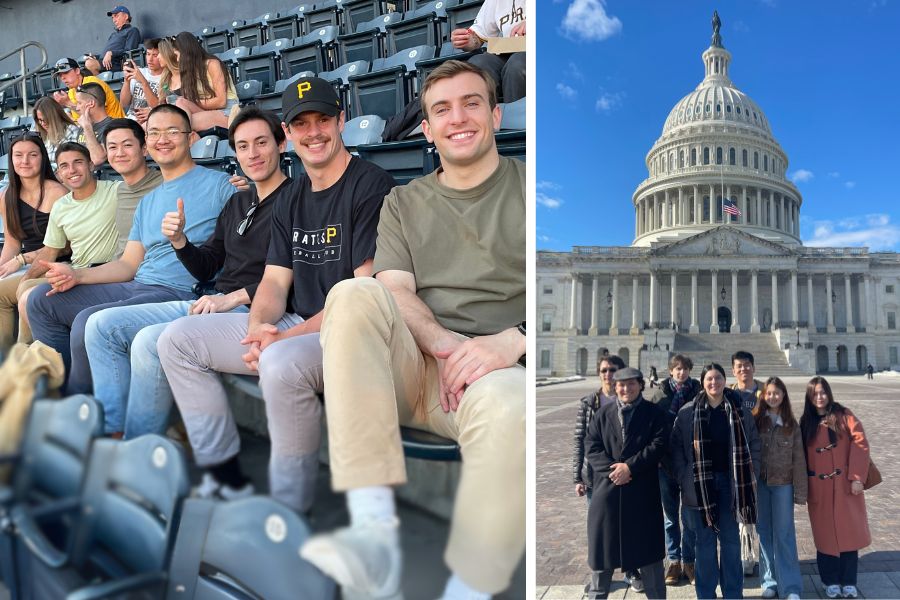
The academic year commenced with a strong emphasis on fostering a cohesive CMIST community. Orientation programs in August provided an overview of academic, research, and support opportunities. Complementing the orientation, CMIST hosted social gatherings including welcome breakfasts, as well as a Gateway Clipper cruise and Pittsburgh Pirates game, which offered students an introduction to the city. Students participating in the Carnegie Mellon University Washington Semester Program (CMU/WSP) prepared for a semester of experiential learning with their own orientation session and tour of the nation’s capital. Our community building also extended to our staff, fellows, and faculty, welcoming them and their loved ones to a picnic at Pittsburgh’s Wightman Park.
September brought the return of CMIST's three speaker series: Lawfully Speaking, Scientists & Strategists, and Conversations with Senior Leaders.
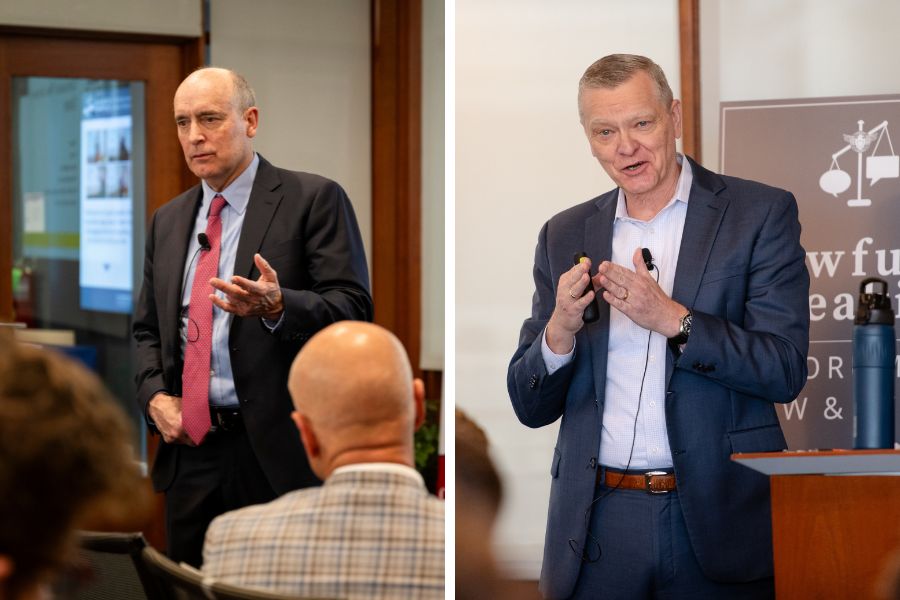
CMIST's Lawfully Speaking continued to provide a platform for exploring the legal and ethical dimensions of critical issues. In the fall, the Honorable Judge James E. Baker addressed the future of artificial intelligence (AI) regulation and national security in his presentation, “Promise and Peril: The Next Ten Years of National Security AI and its Regulation.” The spring installment featured William Renn Gade, who discussed the legal and ethical implications of technological advancements in military operations in his presentation, “The Revolution in Military Affairs, Law, and the Future of Warfare.”
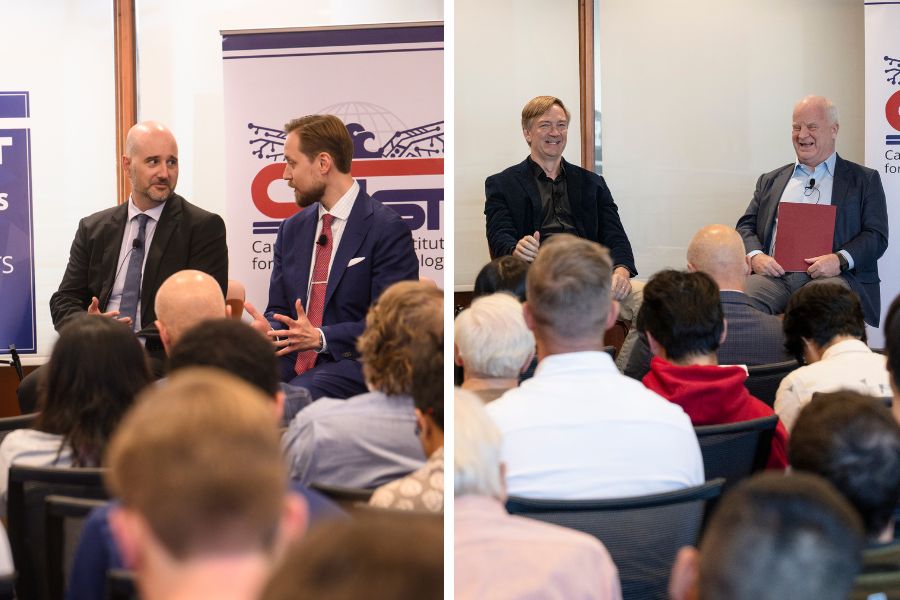
Bridging the gap between scientific innovation and strategic policymaking, the Scientists & Strategists series hosted several prominent experts throughout the year. In September, Harry Krejsa and Costa Samaras explored the vulnerabilities, threats, and opportunities accompanying the shift toward sustainable energy in "Securing Tomorrow: US Industrial Strategy, Security, and the Clean Energy Transition." October welcomed Jeff Schneider and T.X. Hammes for a discussion on the effects of major technology changes in "Human and Machine: Evolving Military Strategies in the Age of AI and Robotics.” In January, Matthew Fuhrmann presented insights from his latest book in "Influence Without Arms: The New Logic of Nuclear Deterrence." February hosted two events: Adam Segal examined how the changing relationship between the US government and private industry affects national security and foreign policy in “How Tech Firms Shape Geopolitics,” and Kori Schake spoke on how military and political leaders can work together to preserve and strengthen collaborations in “Civil-Military Relations: Throughout History and in Modern Times.” At the end of March, Laura DeNardis and CMIST Non-Resident Fellow Lauryn Williams considered questions of satellite security, cybersecurity, and efforts to secure the solar system internet in "Cyber Flashpoints In Space." This year’s series concluded in April with Mahadev Satyanarayanan and Justin Fanelli discussing the potential of public-private collaboration to accelerate innovation in “Beyond the Cloud: The Rise of Edge Computing.”

CMIST's Conversations with Senior Leaders series provided invaluable opportunities for members of the campus community to hear from prominent figures. In September, the institute hosted Dr. Stacey A. Dixon, then the principal deputy director of national intelligence, who discussed the intelligence community's commitment to providing objective analysis to inform policymakers, while highlighting their work with universities to improve knowledge and understanding. Noting that her engineering background equipped her with valuable problem-solving and teamwork skills, she encouraged students to seek out opportunities to incorporate public service at various stages of their careers.
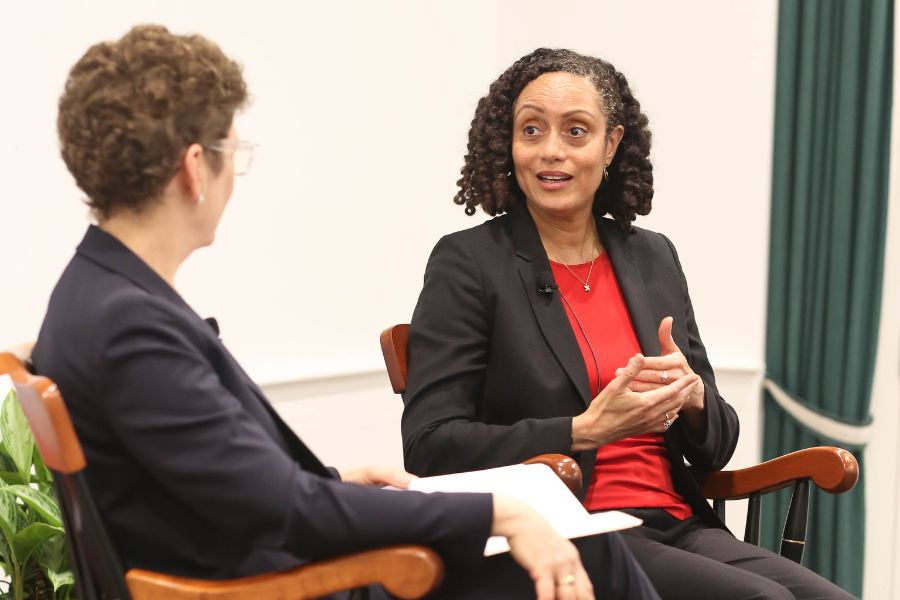
Beyond the institute's standard speaker series, CMIST and Carnegie Mellon University hosted a policy dinner event, "Digital Diplomacy: Building Solidarity in Cyberspace," bringing together US Ambassador Nathaniel Fick, Ambassador Benedikt Wechsler of Switzerland, and Minister Paula Bogantes Zamora of Costa Rica for an international exchange. Preceding the evening forum, the diplomats engaged in tours, lectures, and bilateral meetings centered on global challenges and diplomatic strategies. Opening with remarks by Provost Jim Garrett and CMIST Director Audrey Kurth Cronin, the dinner featured a keynote address by Ambassador Fick. Minister Bogantes and Ambassador Wechsler then joined Professor Cronin and Ambassador Fick for a panel discussion on trends, challenges, and opportunities in the cyber and digital realm.
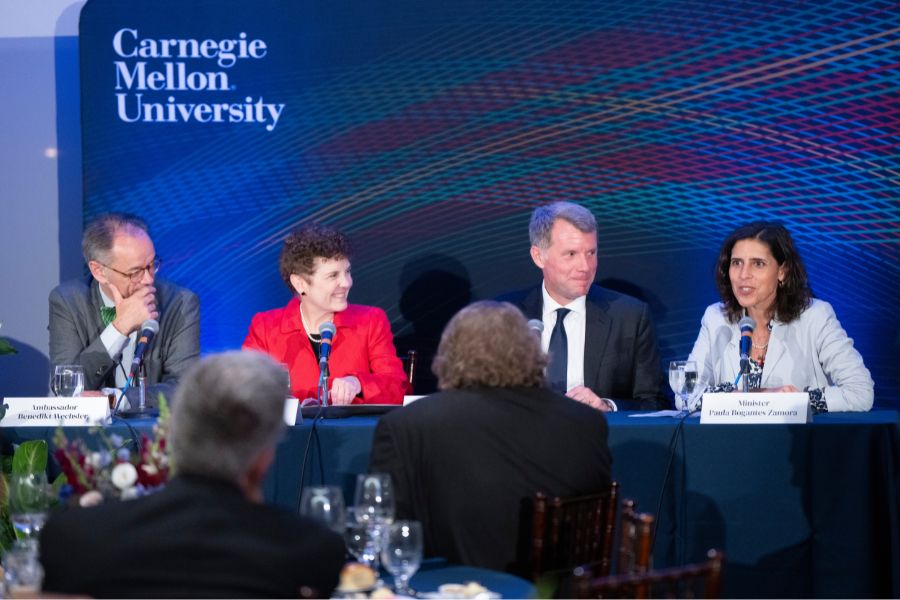
To mark CMIST's first anniversary, Ambassador Fick also participated in "Celebrating CMIST: Pathways to Public Service,” a Conversations with Senior Leaders event that focused on his own career journey leading him to public service and opportunities for students.
In addition to encouraging attendance at our speaker series, CMIST prioritizes student engagement by offering exclusive events and networking opportunities. Politics & Pie, held in fall and spring each year, provides informal opportunities for students to learn about course offerings and connect with faculty. In November, CMIST hosted a Technology, Law, and Democracy: Student Law Roundtable with Professor Harvey Rishikof, who teaches regularly for the CMU/WSP. Additionally, our graduating master's students wrapped up their semesters with the MITS Capstone Presentations & Reception in December and at the Master of Science in International Relations and Politics (MS IRP) Thesis Presentations in April.
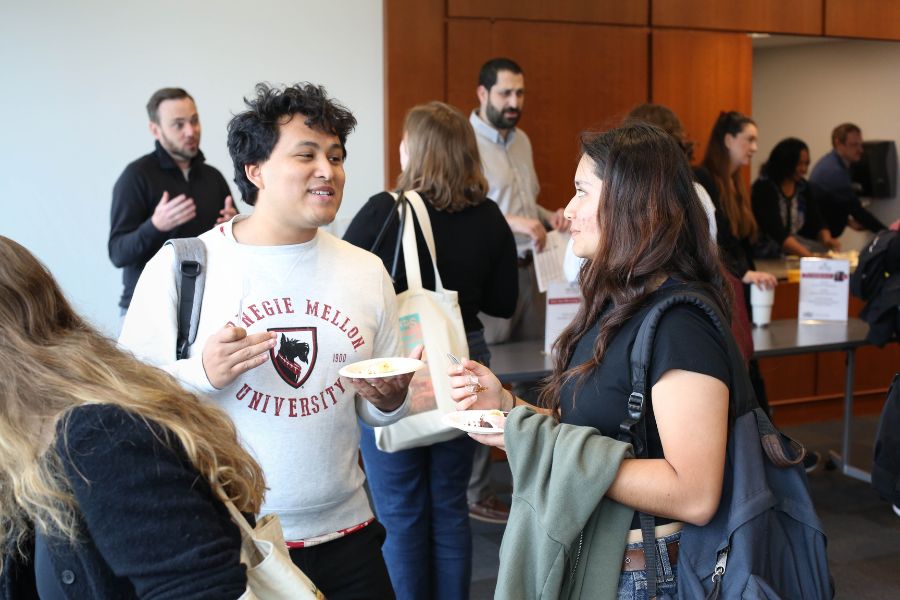
This academic year marked significant milestones, including the release of CMIST’s inaugural annual report and its first white paper, Sun Shield: How Clean Tech & America’s Energy Expansion Can Stop Chinese Cyber Threats. To showcase the publication of the white paper, CMIST hosted an event in January featuring its author, Harry Kresja, who spoke on clean technology, national security, and US-China relations. In a notable academic development, Carnegie Mellon University established the Pi Sigma Alpha chapter of the National Political Science Honor Society, with CMIST hosting the inaugural initiation in the spring.
The Political Science Research Workshop (PSRW) continued to provide a regular forum for our faculty and researchers to present and discuss their ongoing work. Organized by Assistant Professor Daniel Silverman, eleven PSRW sessions were held throughout the academic year. CMIST also celebrated the publication of Silverman’s first book, Seeing Is Disbelieving: Why People Believe Misinformation in War, and When They Know Better, with a book launch event in March.
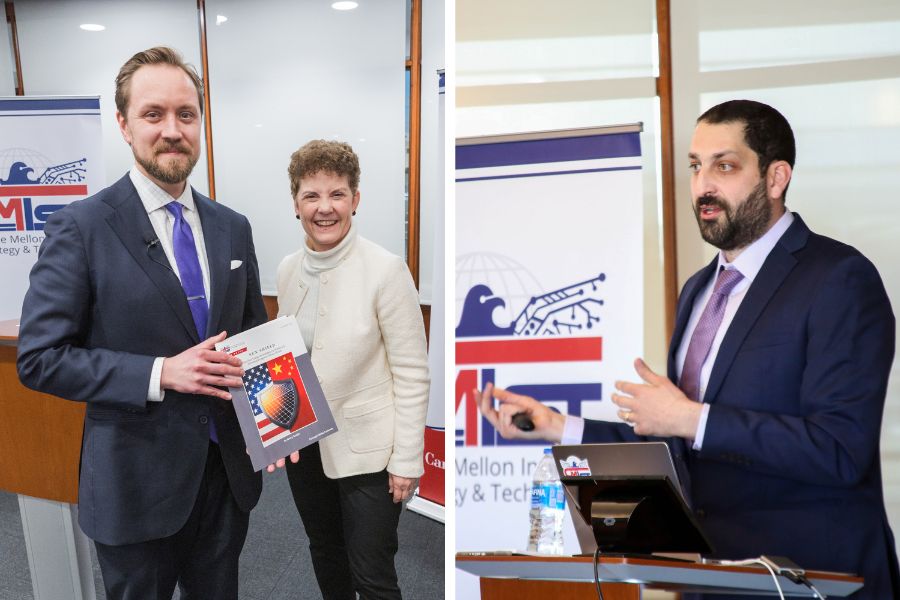
This year, CMIST continued to build upon its strong collaborative relationships, notably partnering for the second consecutive year with Heinz College of Information Systems and Public Policy in February to host officers from the United States Army War College's International Fellows Program for in-depth briefings and a tour of the robotics research lab. In parallel, this marks the second year in a row that CMIST collaborated with the Center for Student Diversity & Inclusion, Center for Technology, Center for Informed Democracy & Social Cybersecurity, Reserve Officers’ Training Corps (ROTC), Veterans Employee Resource Group, Heinz College of Information Systems and Public Policy, Tepper School of Business, and the Office of the Registrar to offer a military community reception, building connections and a sense of belonging for our CMU service members. Additionally, functioning as a collaborative "team of teams" within CMU, CMIST regularly hosted tours and briefings at university facilities and labs for its network and external guests to highlight ongoing research.
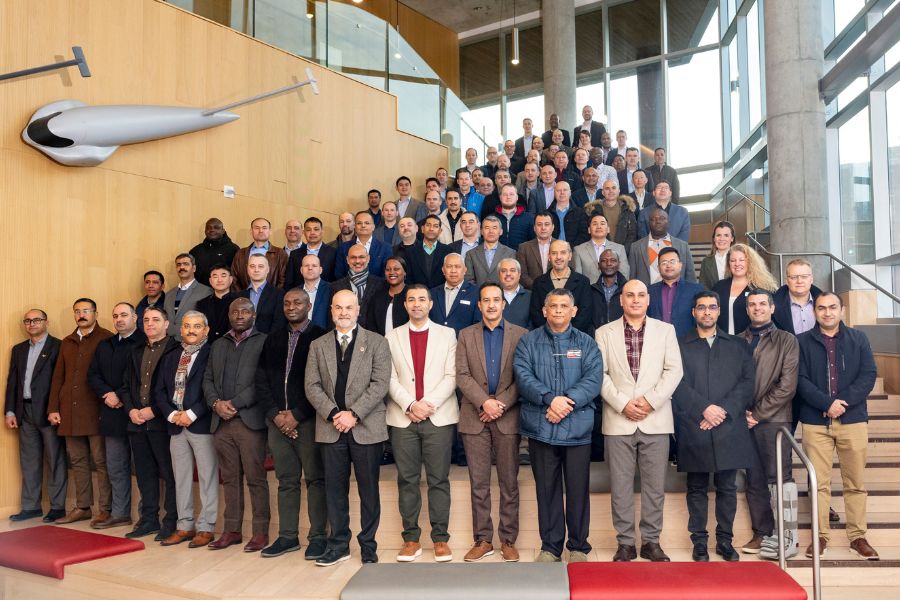
The 2024-2025 academic year featured a dynamic and impactful program of events that continues to add to Carnegie Mellon University’s rigorous academic landscape and fostered critical engagement regarding pressing global challenges. As the academic year concludes, we send our graduating class forward, assured that with the knowledge, connections, and research skills they've gained, they will contribute to a more informed and secure future.
(Image 1, left: CMIST graduate students at a Pittsburgh Pirates game; right: students participating in the Carnegie Mellon University Washington Semester Program in Spring 2025 in front of the Capitol; Image 2, l to r: Honorable Judge James E. Baker and William Renn Gade present at Lawfully Speaking; Image 3, l to r: Scientists & Strategists welcomed Costa Samaras and Harry Krejsa as well as Jeff Schneider and T.X. Hammes in Fall 2024; Image 4, top, l to r: Matthew Fuhrmann, Adam Segal, and Kori Schake joined Scientists & Strategists in Spring 2025; bottom, l to r: CMIST hosted Laura DeNardis, Lauryn Williams, Mahadev Satyanarayanan, and Justin Fanelli for our final two Scientists & Strategists events of the academic year; Image 5, l to r: CMIST Director Audrey Kurth Cronin and Dr. Stacey A. Dixon, then Principal Deputy Director of National Intelligence; Image 6, l to r: Ambassador Benedikt Wechsler of Switzerland, CMIST Director Audrey Kurth Cronin, US Ambassador Nathaniel Fick, and Minister Paula Bogantes Zamora of Costa Rica; Image 7, students and faculty gather at Politics & Pie; Image 8, l to r: Harry Krejsa, Audrey Kurth Cronin, and Daniel Silverman; Image 9, officers from the International Fellows Program of the United States Army War College pose for a group photo)
